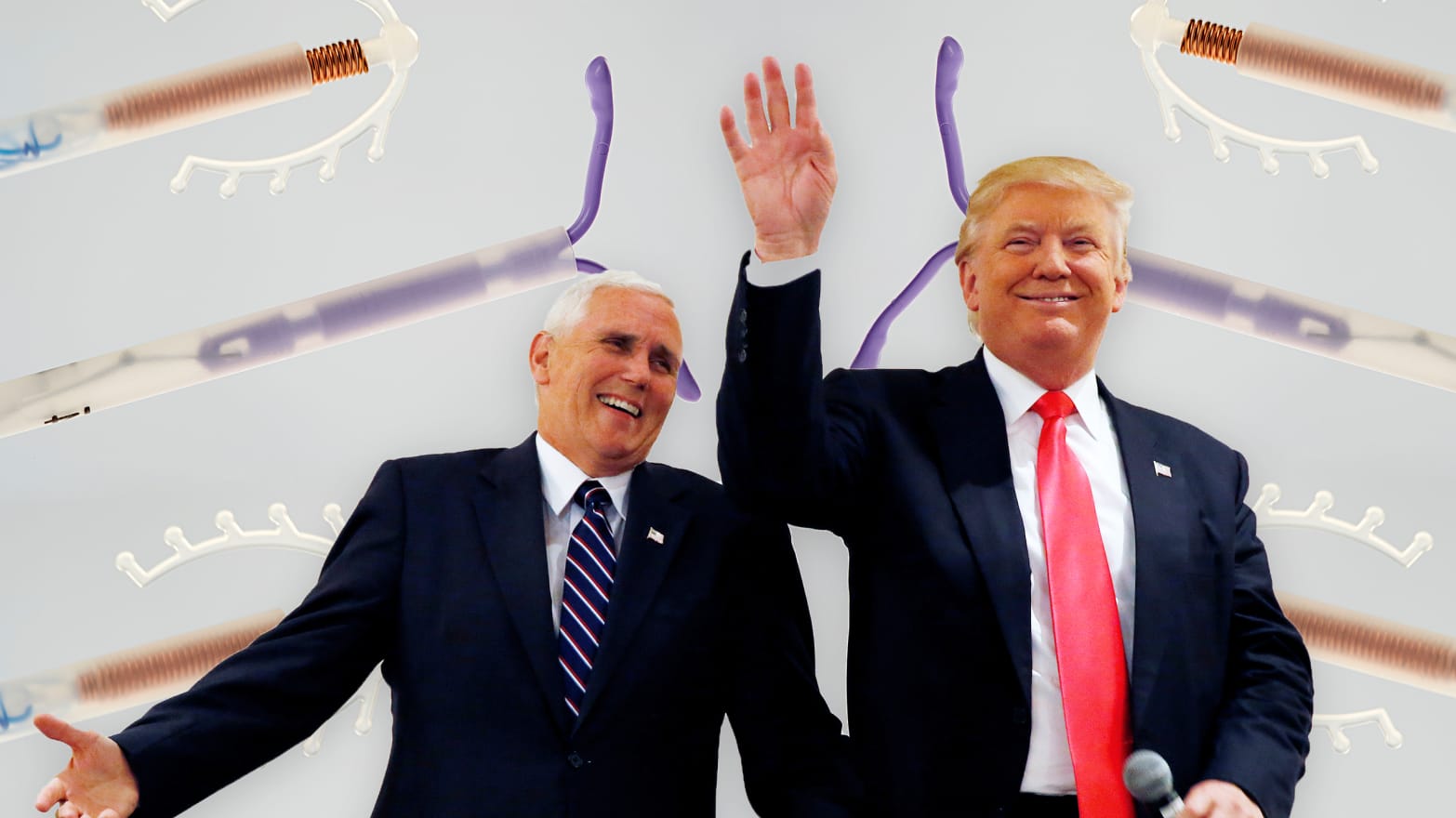Like the waistline of a pair of skinny jeans after a weekend of dismay-drinking, the presidential race is tightening. For women who don’t want to have kids in the near future, this means a few things. First, to prevent electoral catastrophe, they’ve got to vote as hard as they can on November 8 (or earlier!). And the very next thing they should do after voting is run—not walk— to their local gynecologist’s office and get an IUD. Don’t worry about scaring the doctor; this is urgent!
Getting an IUD now—right now—is a simple move that can at least get a lady who isn’t ready to be a mother through the next legislative term as unpregnant as possible. After all, access to low-cost birth control isn’t guaranteed. No matter what happens after the new batch of elected officials are sworn in, the only guarantee is that the way things are now is going to change.
Donald Trump hasn’t proposed the government outlaw IUD’s. The GOP presidential nominee probably doesn’t know what they are, and Mike Pence comes across as the kind of guy who is so mortified by the female anatomy that he casts his eyes shamefully downward as he passes the Walgreen's tampon aisle. But what Donald Trump has promised to do—and what Mike Pence has actually done during his tenure as governor of Indiana—is to make birth control a lot more difficult for women to access.
Intrauterine Devices are highly effective when appropriate—more effective than nearly every form of birth control, and completely reversible. Like everything, they sometimes cause unpleasant side effects, but, then again, so does spending three days every month freaking out about a possible unplanned pregnancy, or being pregnant. The best feature of IUD’s, though, is how long they last. Once it’s been inserted by an OB-GYN and depending on the model, the device lasts three, five, or nine years. That’s a legislative term, or a presidential term plus one year, or a two-term presidency plus one year. Women can keep their uteruses as vacant as Antonin Scalia’s Supreme Court seat with one of these things!
Before the Department of Health and Human Services declared that birth control counts as preventative care under the Affordable Care Act, the primary barrier between American women and IUD’s was up-front cost; they run between $500 and $900. But if Hillary Clinton loses on November 8, and if along with her loss goes the Senate and House, the repeal of Obamacare is all but inevitable come January. And the repeal conservatives have promised will likely mean the free IUD benefit vanishes, and accessible birth control goes back to being either a daily responsibility that doesn’t work as well or a serious surgical intervention that can’t be reversed.
Even a female Trump voter would be remiss to forego Obamacare’s IUD benefit; to not take advantage of it would be to fail to exploit loopholes in the law. Would kind of Trump follower would one be if they weren’t using the system to their own advantage in every possible way?
Beyond Obamacare’s repeal, access to low-cost birth control has never been stable. At the state level, right-wing legislators have taken steps to make it more difficult for women who need contraception to access it without encountering financial and logistical hurdles, an ironic stance for a person who fancies himself a fiscal conservative. And defunding Planned Parenthood, on the wish list of the GOP for years, would be more likely than ever under a Trump-Pence administration. (In fact, Governor Mike Pence was the first to attempt to defund Planned Parenthood.) That means women who would have trouble paying for birth control out-of-pocket will have fewer options. A Trump-Pence administration will surely Make Birth Control A Huge Pain In The Ass Again.
Women who have quelled their fears of undersized conservative hands grabbing at their reproductive health options by banking on long-promised male birth control have another thing coming, too. A recent study that found a type of injectable male birth control 96 percent effective was recently discontinued because researchers decided that the potential risks to men using it were greater than the potential benefits they could gain, writes Julie Beck at The Atlantic. Beck goes on to note serious side effects that women experience while on the pill—cramping, moodiness, weight gain—and laments the unfairness of what women must deal with on a daily basis. But then again, men can’t get pregnant, and biology is unfair.
So on Election Day, ladies who wish to remain not-pregnant for a few years, do your patriotic duty and cast your ballot. And once you’ve done that, hedge your bets.
We’re not saying that Donald Trump is going to beat Hillary Clinton on November 8. But it’s not an impossibility. And better safe than sorry.

